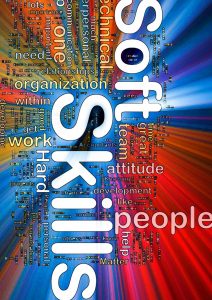The 5 most important soft skills of the future


It would appear that the goal of every second headline on the topic of “the future of work” is to instill an inherent fear in workers regarding what is to come and concerning the status of their careers and their future AI coworkers. The message seems to be: “Robots are coming for your jobs and there isn’t much you can do about it.” The former portion of this message is somewhat true, automation is on the rise, which will cause many positions to be filled by high-speed, data-crunching technology. But the latter, rather uninspiring portion, is not true. Working humans are not doomed as long as the companies they work for recognize the skills of the future and focus on building and developing the areas robots cannot do well.
Soft skills are the future of work
Because of the focus on technical or “hard” skills of both schools and businesses, many young employees and seasoned workers alike are entering the workforce unprepared and unarmed with the soft skills that will future-proof their careers. Businesses need to switch focus away from training in the hard and technical skills that, through automation, will soon become obsolete. And instead, invest in the future of their employees and the longevity of the company by providing training and development opportunities that will allow their staff to develop their future-proof soft skills. So, what are these soft skills that will allow us to work along with technology instead of against it? Let’s look at 5 of the most important soft skills of the future.
1. Empathy and Communication
Building trust and relationships between companies and consumers is essential to almost every industry and cannot be done without a genuine human connection that comes with communicating with an empathetic person. Try as we might to streamline processes, such as sales and customer service, by replacing people with technology, human interaction is still paramount in these areas.
According to a study by Google [1], 60% of consumers still prefer to speak to a person when they reach the purchase phase of a buying cycle. While a study by learning and outsource company CGS found that nearly 50% of consumers would prefer to communicate a question or concern through a conversation with a real person over a company’s chatbot [2].
Some businesses are already beginning to take action surrounding the development of these essential soft skills. According to The Wall Street Journal, 20% of employers now offer empathy and communication training, which is up substantially from 10 years prior [3].
2. Critical Thinking and Creative Problem Solving
A survey by B2B research company Clutch discovered that critical thinking skills, including creative problem-solving and adaptability, will be essential to the future of work, meaning businesses must invest in the development of soft skills, such as critical thinking, now [4]. No matter how advanced our technology may become, humans will always need to be present to make critical decisions and brainstorm new and innovative solutions. Many law firms today use AI to help search through and identify relevant documents in legal cases, but a human judge and a jury of people will still make the ultimate decisions in court [5]. Companies are beginning to recognize the importance of soft skills, such as critical thinking and creative problem-solving. The same survey finds that hiring managers are nearly twice as likely to value problem-solving skills compared to digital or technical skills.
3. Creativity
The World Economic Forum predicts that creativity will go from being the tenth most important job skill in 2015 to the third most important job skill by 2020 [6]. This means that creative roles will not only be safe from automation, but creative skills, such as discipline, curiosity, and open-mindedness, will, in fact, increase in importance and demand as time goes on. This reinforces the fact that businesses should be investing in developing the creative skills of their current and future employees alike.
4. Strategy
Many businesses are using automation tools, such as data-based algorithms and scheduling assistants, for posting digital content to help make individual tasks easier and more efficient.
While these automation tools can be helpful time-savers, what they don’t provide is the overall strategy that gives these individual tasks relevance. Our helpful data-crunching sidekicks only provide us with numbers and statistics. It is up to humans with strong, strategic-thinking skills to give meaning and derive a purpose and strategy from all that information. In order to continue to implement successful business strategies, it is important that companies invest in improving the future-proof, strategic-thinking skills of their employees.
5. Imagination, Innovation, and Vision
With all the technological advancement over the past few decades, we tend to forget who is behind all that innovation—people, more specifically, people with vision. Innovative people have and always will dream up the visions that shape our future, something a computer lacks the imagination to do. Companies in every industry will benefit from encouraging inspiration and innovation by providing employees the opportunity to develop their skills to grow within or outside of their roles.
Technology will inevitably play an increasingly large role in the future workplace. Developing the soft skills of tomorrow in workplaces today will provide employees with the opportunity to use the very skills that make them human to work with their future AI coworkers, not against them.
Bookboon helps develop your employee’s future-proof soft skills today so they are ready for tomorrow. That’s why we made our popular eBook Soft Skills free for a limited time. Check it out here!
References:
[1] The Role of Click to Call In the Path to Purchase
[2] Chatbots Deliver Speed, But Consumers Still Want Humans. Are We Moving too Quickly to Automation
[3] Companies Try a New Strategy: Empathy Training
[4] What Impacts Workers’ Optimism About the Future of Work?
[5] Six ways the legal sector is using AI right now
[6] The 10 skills you need to thrive in the Fourth Industrial Revolution




